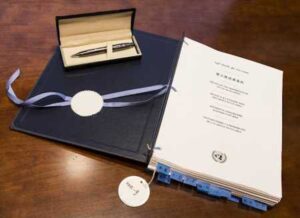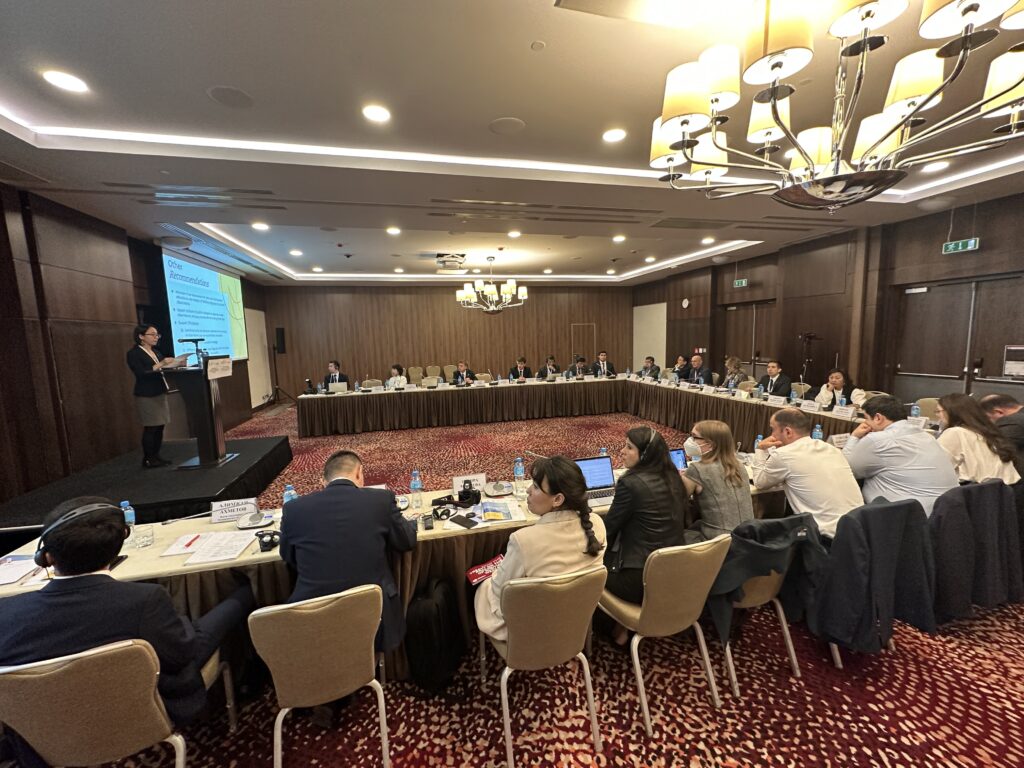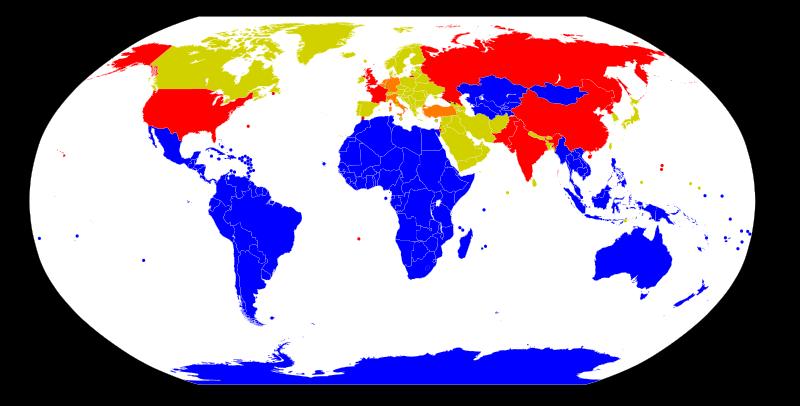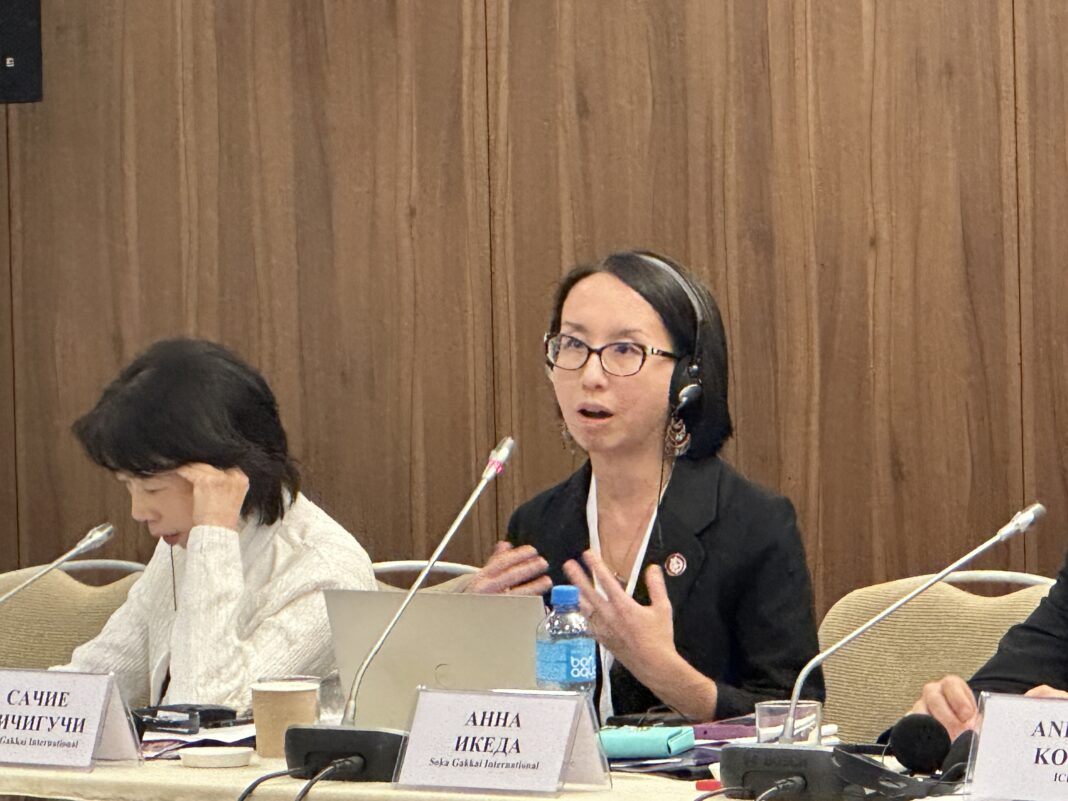Anna Ikeda is the program coordinator for disarmament of the Soka Gakkai International (SGI) Office for UN Affairs, whose work focuses on nuclear abolition and stopping killer robots. The following is her presentation at the the Regional Conference “Humanitarian Consequences of Nuclear Weapons and Nuclear-Weapon-Free Zone in Central Asia” convened by the Ministry of Foreign Affairs of Kazakhstan, in partnership with the Center for International Security and Policy (CISP), Soka Gakkai International (SGI), the International Committee of the Red Cross (ICRC), and the International Campaign to Abolish Nuclear Weapons (ICAN), in Astana, the capital of Kazakhstan, to mark this year’s International Day against Nuclear Testings(Aug 29).
By Anna Ikeda
Astana (INPS Japan) —It is a great pleasure to be part of this important regional conference and exchange thoughts with all of you, as we work towards our shared goal of a world without nuclear weapons. I’d like to thank you for being here, and thank all the co-organizers for making this conference a reality, especially the Ministry of Foreign Affairs.
We’ve heard some presentations from our colleagues earlier about the humanitarian consequences of nuclear weapons, including the testimony from Mr. Dmitriy Vesselov. We cannot and should not talk about nuclear weapons without squarely facing the devastating impacts they have on people and our natural environment. And it is particularly important to do so at this conference, as your region experienced such devastating consequences, and the current global challenges we face make the discussion even more relevant.
So why talk about peace and disarmament education?
Before I go further, I want you to pause for a moment and think about a social issue you personally care about. Can you recall how you developed your interests and passion?
Was it something you personally experienced, or by someone close to you? Was there something you read or watched, that helped you develop your perspectives? What was so powerful about it?
Now, I also want you to think about a political process you have engaged in, either currently or in the past. I’m sure there were some elements of self-education, where you made yourself familiar with the issue. You may also have worked to inform key stakeholders about the matter. In some cases, you may have worked on an awareness campaign to inform the broader public.
So, you can see, it may not be an exaggeration to say that education is part of all of our endeavors. It holds the same for nuclear disarmament.
Here, you may notice that I am using the term “education” rather broadly. I believe education can take a number of forms. It is not confined to school-based learning though it is very important. But when we share information, share perspectives, or engage in dialogues, we are engaging in opportunities to facilitate learning.
My organization, Soka Gakkai International, has engaged in various forms of peace and disarmament education activities at the grassroots level, based on our conviction that education and awareness-raising is the key to strengthening the norms against nuclear weapons, and also to empower individuals to become engaged in the issue. We have also continued to provide opportunities for young people to listen to survivor testimonies, as even in Japan such opportunities are becoming rare.
Peace and disarmament education is critical in strengthening and promoting norms against nuclear weapons and other weapons of mass destruction. Yet we often do not pay attention to it, perhaps because we engage in educational activities quite unconsciously.
We just heard from our colleague from ICAN about the humanitarian initiative, the processes that led to the eventual drafting and adoption of the TPNW, and about the international conferences on the humanitarian consequences of nuclear weapons, which took place in 2013 and 2014. These were vital occasions for learning about the catastrophic impacts that would result from any use of nuclear weapons and for dissemination of the facts of these realities to a broad international audience.
A heightened understanding of the inhumane nature of nuclear weapons—among decision-makers, military personnel and the general populations of both nuclear-weapon and non-nuclear-weapon states—has provided an important background to the process leading to the negotiating conferences as well as the current efforts for universalization. In this sense, learning and education have been central to the TPNW and will need to continue to be so, if states are to implement it.
TPNW and Peace and Disarmament Education
The preamble of the TPNW states:

“Recognizing also the importance of peace and disarmament education in all its aspects and of raising awareness of the risks and consequences of nuclear weapons for current and future generations, and committed to the dissemination of the principles and norms of this Treaty…”
Peace and disarmament education is essential to the achievement of the objectives of the TPNW, as awareness-raising for the public will help underpin and maintain the principles and norms of this Treaty globally. Peace and disarmament can only be achieved through an informed and continued demand by people, understanding each person’s common responsibility for achieving this goal and strengthening the norm that disarmament—including the prohibition of nuclear weapons—is a critical step for international peace and security.
Potential of Peace and Disarmament Education for a World Free of Nuclear Weapons
That your countries are part of the Nuclear-Weapon Free Zone in Central Asia, shows your commitment to the world without nuclear weapons. It is our hope that, as the first NWFZ in the northern hemisphere, you would help spread and strengthen the norms against nuclear weapons globally by supporting and joining the TPNW.
To that end, I’d like to share some ways in which you can increase the normative impact as you work toward joining the TPNW and beyond.
1. Education about the Humanitarian Consequences of Nuclear Weapons
First, as I mentioned in the beginning, I strongly believe that any education about nuclear weapons must include, and ideally start with, raising awareness about the devastating humanitarian consequences of nuclear weapons. As we heard in the powerful testimony by Mr. Vesselov, learning about the impact of nuclear weapons reminds us what they are – that they are weapons of mass destruction, designed to kill hundreds of thousands of people, while causing long lasting damage on people’s health and our environment over generations.
Such learning helps us understand that this is not an abstract issue about political tools; it is about our lives—all of us.
In a study conducted in the U.K in December 2021, the Nuclear Education Trust gathered 211 responses from teachers within secondary schools across England, representing 7% of secondary schools in the country. Their study found that 93 percent of the respondents do not agree that nuclear disarmament education is too political to be taught in schools. In addition, 95% either strongly agreed or agreed that students should be aware of the humanitarian consequences of using nuclear weapons.

I believe every person deserves to know about the danger of nuclear weapons and that the only way to ensure our collective security is their elimination. It is therefore my strong wish that you will continue to help raise awareness.
International commemorations and observances like today are wonderful opportunities for such activities. This March, we also marked the first International Day for Disarmament and Non-Proliferation Awareness, an initiative of Kyrgyzstan. I applaud the government of Kyrgyzstan for their efforts and hope we can all support that.
In addition, your countries could provide support – which could be financial or institutional – to international organizations, associations of survivors and affected communities, civil society, and educational institutions promoting peace and disarmament education, particularly regarding the TPNW and the humanitarian consequences of nuclear weapons.
You may support research on the humanitarian and environmental consequences of nuclear weapons.
Finally, you could support research addressing the role that colonialism, racism, patriarchy and other structures of oppression have played and continue to play in the development, deployment, testing and use of nuclear weapons.
2. Utilizing the NWFZ as a framework for disarmament education
Second, NWFZs are excellent venues for promoting disarmament education. Conferences like this are a valuable venue for mutual learning and to identify action plans.
The Conferences of Nuclear-Weapon-Free Zones and Mongolia held in 2005 and 2010, as well as at related meetings, the importance of disarmament and non-proliferation education was affirmed.
The 2018 report on Cooperation among NWFZs, published by the Vienna Center for Disarmament and Non-Proliferation (VCDNP), identifies disarmament education as a potential area of collaboration among various NWFZs. The report lists specific examples such as online courses for diplomats and secretariat personnel from different NWFZs and regional institutions; regional short courses on nuclear disarmament, non-proliferation, and other issues relevant to the zones; cross-regional seminars on issues of joint interest; and developing learning materials on the politics and ethics of NWFZs for high school and graduate courses.
Our local organization of the Soka Gakkai in Mexico has worked closely with OPANAL to conduct educational and awareness-raising activities. Most recently, in July this year, Secretary-General of OPANAL attended the opening of the exhibition “Everything You Treasure” which we co-produced with ICAN, at the Dr. Jose Maria Luis Mora Research Institute.
I hope we can continue to raise awareness of the important role the NWFZ in Central Asia plays in international security, both within your region and globally. Such educational opportunities could be available for various audiences such as diplomats, general public, and youth.
This afternoon we will also hear about the complementarity between the NWFZ in Central Asia and the TPNW. Deepening our understanding of these multilateral instruments, will help us perceive how they work in synergy with each other. We hope that such information will continue to be shared with key stakeholders within your governments, as well as those in civil society and the public, to gain their support of the TPNW.
My organization has worked closely with the Caribbean region, for example, together with our colleagues from ICAN, to support the universalization of the TPNW in their region. And it was similar efforts to gain their understanding of the complementarity between the Treaty of Tlatelolco – which is the NWFZ they are part of – and the TPNW, as well as the relevance of the issue to their region, that accelerated the pace of ratifications and signatures in the CARICOM region.

3. Other Recommendations
Finally, there are other actions you could take, both domestically and at the international fora, to demonstrate your support for peace and disarmament education.
Please continue to articulate in your statements that peace and disarmament education is a key element of fulfilling obligations for nuclear disarmament.
Please support inclusion of youth in delegations regarding nuclear disarmament, and policy conversations including TPNW Meetings of States Parties and Intersessional meetings.
You can also support UN initiatives such as the UN Secretary-General’s biennial study on disarmament and non-proliferation education. We should also become familiar with the UNODA disarmament education strategy. The Office for Disarmament Affairs Regional Centre for Peace and Disarmament in Asia and the Pacific also works on disarmament education as one of the programmatic areas, and it conducted baseline research on disarmament education. I saw that Tajikistan and Uzbekistan are part of it, and I look forward to seeing the results when they are published.
Conclusion
To conclude, as a person of faith, I must share that, despite the challenging nature of our work, I remain hopeful. As informed citizens, let us take what we have learned into action and do all that we can, to achieve a world without nuclear weapons.[INPS Japan — September 18, 2023]
Related article: G7 Hiroshima Summit: Opportunity to Rethink National Security


